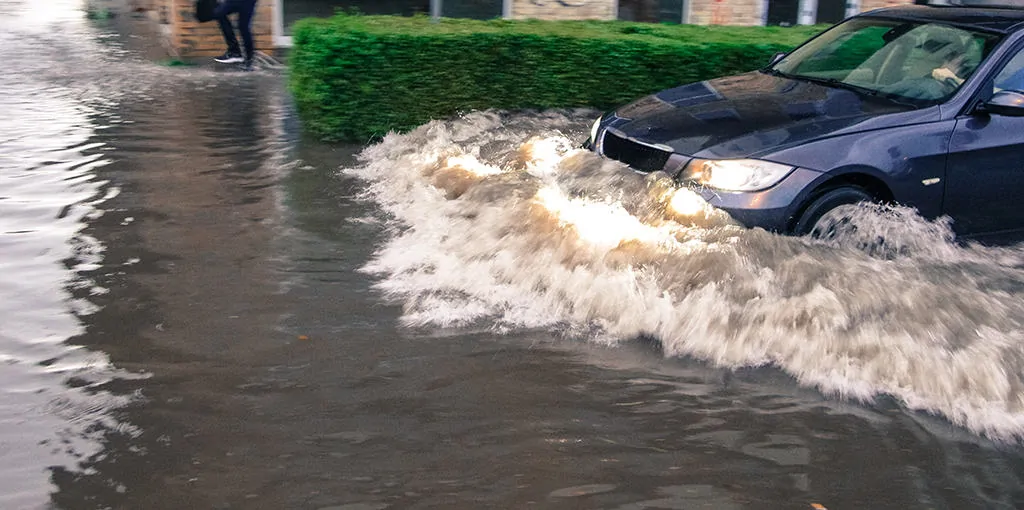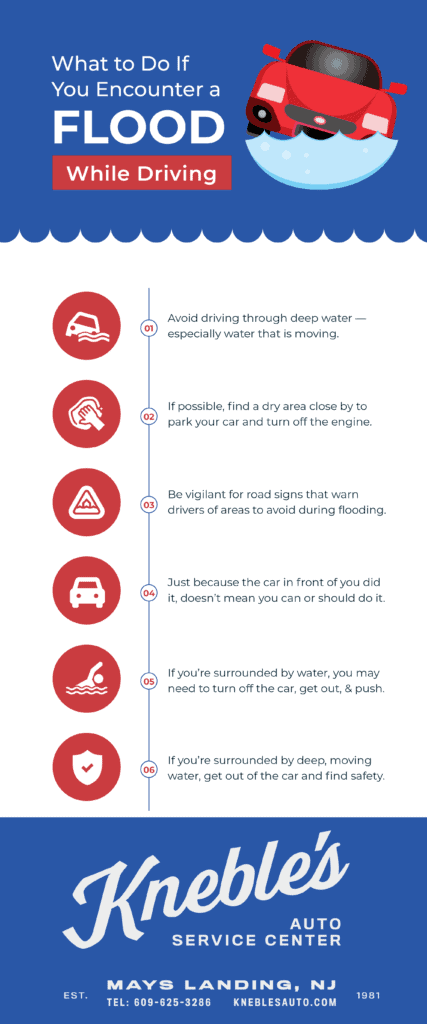Table of Contents

Did you know driving a car through flood water can potentially ruin its engine? It’s true — especially if you reside in a shore town where flooded roads mean driving through saltwater.
Watch this video for a quick rundown on the risks you take when driving through water, then continue reading for deeper insight on some issues we’ve repaired in cars that sustained flood damage.
Transcript:
What are you thinking when you suddenly come upon a lot of water in the road from possibly a hard rainstorm or broken water pipe?
Do you think I can drive through that? It doesn’t seem that high.
What could possibly happen to my vehicle?
Hi, I’m Nancy at Kneble’s Auto Service Center and stop right there. Think twice, because you could do damage to your vehicle.
If you drive through that high water, your engine can hydro lock. This is when the engine stalls. See your vehicle’s engine acts like a vacuum cleaner and sucks all the water through the air intake.
The water gets into the cylinders where the pistons freeze, stopping your engine.
Now sometimes there can be so much water in the engine that you’re actually doing damage to the internal components that are irreversible, causing you to start shopping for a new vehicle or getting a new engine.
So, next time you come upon a large pool of water, think first, because first and foremost, be safe.
12 inches of moving water can push your vehicle off the road.
Once you’re safe, avoid the water or stop your engine and get pushed out of the water. See, I’m not doing that. And get somebody to do that for you.
Also, stay clear of the large pools of water would be a lot easier. Instead, swim in them during the summer. Keep splashing, just not with your vehicle.
How Driving Through Flood Water Can Damage Your Car
Engine Damage
The damage you can cause to a car’s engine by driving through flood water is nothing to scoff at.
If the floodwaters are deep enough, your engine may end up ‘hydro locking,’ which, in layman’s terms, translates to “stalling” and “costly damage.”
Has your vehicle been damaged from floodwaters?
Let our expert auto technicians inspect and repair your flooded vehicle today!
When hydro locking occurs, water enters the engine cylinders via the air intake system, causing the pistons to freeze which results in stalling of the vehicle. In many cases, the damage caused by hydro locking is irreversible.
How to Repair Water Damage in Your Car’s Engine: Replace the engine or the vehicle.
Transmission Damage
While some transmissions are more resistant to water than others, none are designed to be submerged in water.
When driving your car through a flash flood, water can easily flow over the transmission and into the vent.
Once water gets in, it dissolves the transmission’s linings and the lubricant begins to fail, resulting in total failure of the transmission. Water can also damage your car’s transmission by causing the gears to slip.
How to Repair Water Damage in Your Car’s Transmission: If water stays in the transmission for too long, it must be rebuilt entirely.
Brake & Rotor Damage
Did you know that your car’s rotors and brake pads can reach temperatures as high as 392 degrees Fahrenheit during normal use?
It makes sense when you consider the amount of friction needed to stop a two-ton vehicle. But have you considered the damage you can cause to brakes and rotors when they are submerged in water after getting that hot?
This can actually cause your rotors to warp, resulting in vibrating and potentially unpleasant sounds when you apply the brakes while driving.
How to Repair Water Damage in Your Car’s Brakes & Rotors: Flush the brakes and/or replace the rotors.
Are you dealing with brakes damaged from floodwaters?
Avoid any issues by getting your brakes inspected by your favorite local auto technicians!
Issues With Suspension
Most newer cars have their suspension joints lubricated for life at the factory during assembly, but driving through deep water can flush out the lubricant and cause premature rusting.
Your suspension joints may end up failing a year or later after driving through the water during a flood, and you’d probably just chalk it up to standard wear and tear.
But there’s a good chance that driving during a flood was the direct cause.
How to Repair Water Damage in Your Car’s Suspension: Have suspension joints inspected and lubricated by a professional.
Electrical Issues
New cars these days are practically giant, mobile computers — from brakes and transmissions to heated seats and air conditioning, modern day vehicles are increasingly relying on advanced sensors and computer systems to provide a safe and comfortable driving experience.
So, it should go without saying that you risk damaging many of those electrical components when driving a car in floodwaters.
Depending on how deep a car is submerged in water, and for how long, any of the following parts can malfunction or sustain some level of damage:
- Electrical Control Unit
- Headlights, brake lights, blinkers, etc.
- Power Window Controls
- Air Conditioning System
- Windshield wipers
- Power Door Locks
- Sunroof Controls
- Power Seat Controls
In addition to the items listed above, you also run the risk of corroding your car’s battery terminals when you drive through deep water, which can result in difficulty starting the vehicle.
How to Repair Electrical Damage in Your Car: If you believe you are experiencing issues with one or multiple electrical components in your car, enlist the help of a professional who can assess the issue and provide an optimal solution.
Interior Water Damage
Aside from your engine not starting or suddenly stalling in the middle of a flood, interior damage is perhaps the most obvious and unsettling water-related issue your car can sustain.
It only takes a few feet of water for moisture to make its way inside your car and soak the interior.
When the interior seating and floors of a vehicle are soaked with unfiltered floodwaters for too long, mold and mildew may begin to form, meaning costly upholstery repairs may be necessary.
How to Repair Water Damage in Your Car’s Interior: Dry out the inside of the vehicle and consult with a professional who has experience repairing and replacing damaged upholstery.
How Driving Through Salt Water Damages Your Car for Years to Come
If you’ve ever driven in Atlantic County on roads like the Black Horse Pike, Cologne Ave during a severe storm, you’ve probably encountered a saltwater flood before.
You may have driven through a saltwater flood several months or years ago without noticing any immediate damage to your vehicle.
But in reality, it’s likely that corrosive saltwater has been eating away at many of the metallic components it made contact with. Your brakes, rotors, electrical systems — and especially your engine — are particularly susceptible to the corrosive properties of saltwater.
If you can recall driving your current car through flood waters in a shore town at any point in time — even if only for a moment — take a second to think about all the different repairs your car has needed since that time.
There’s a good chance many of those repairs were needed prematurely due to corrosive saltwater accelerating their deterioration. Let a technician at Kneble’s Auto know if you’re concerned that this could be happening to your vehicle.
Flash Flood Driving Tips: What to Do if You Find Yourself on the Road During a Flash Flood
First things first: the most important flash flood driving tip of all is to NEVER DRIVE DURING A FLASH FLOOD! Not only is your car likely to sustain costly damage, but you could be jeopardizing the safety of you and everyone in the car with you.
These flash flood driving tips should only be used in an emergency situation such as an unexpected flash flood:

What To Do After Driving Your Car Through Flood Water
You may have encountered this scenario before if you live or work in a shore town that frequently floods during heavy rainfall, such as Margate, Ventnor, Longport, Brigantine, and Atlantic City, to name a few.
Anyone who has driven their car through flood water — whether by choice or by chance — should strongly consider consulting with a professional who can determine if any damage is present and provide a practical solution.
The qualified team of technicians at Kneble’s Auto Service Center in Mays Landing, NJ, are all too familiar with the consequences of being caught in a flood while driving, so they can provide the service you need to prevent minor issues from manifesting into major malfunctions.
Schedule an appointment today for help assessing and addressing any damage your car may have sustained during a recent flood!

 3 Signs that You Have Power Steering Problems
3 Signs that You Have Power Steering Problems